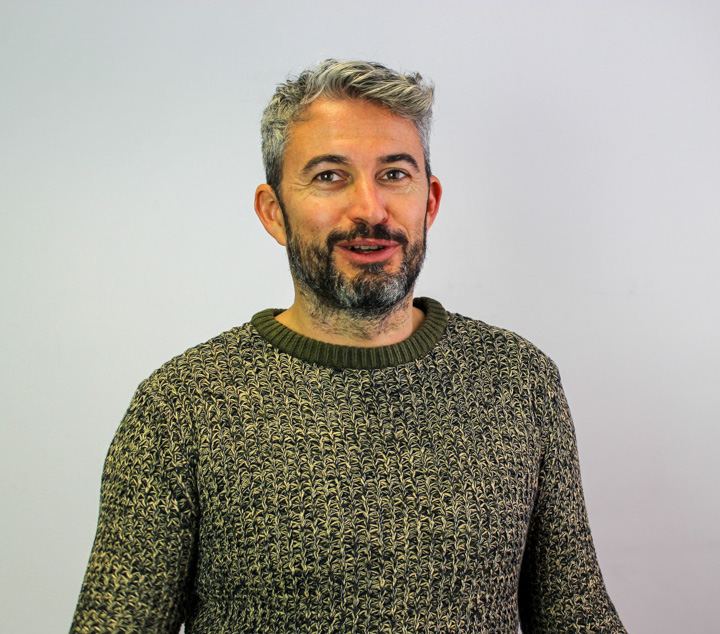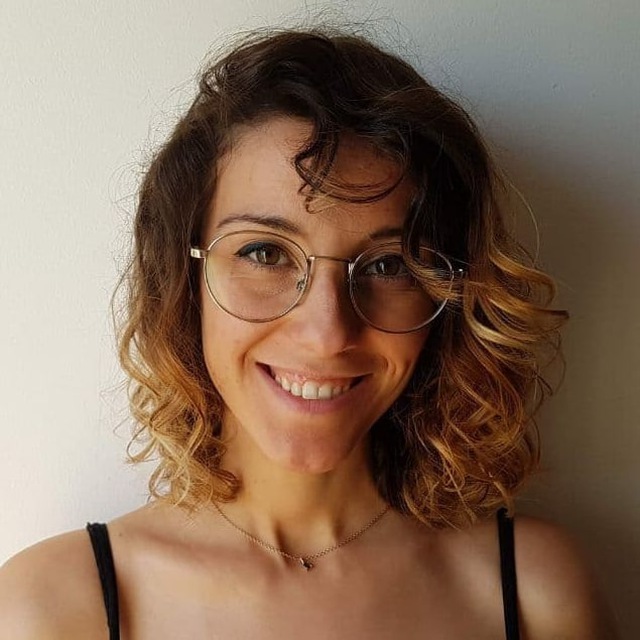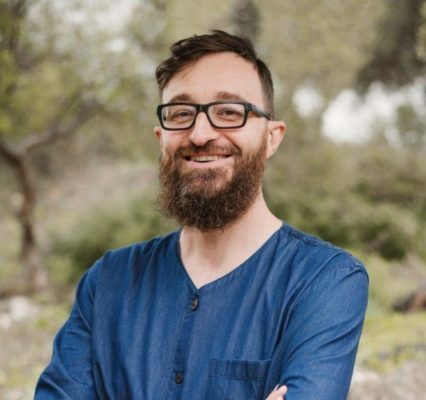Interviews
David Cabo "At Civio, we want the public administration to feel that it is being watched and that it is accountable to the public".

David Cabo, co-founder of Civio and computer engineer and expert in open data, transparency, public information analysis and budget data, has come to our Platonic space in Palma. Cabo talks to Xesca Sastre and Olivier Schulbaum (Platoniq) about deep time, about the accountability of public administrations, about his research (such as the -bono social, the global gap in access to health, the pardons granted in Spain since 1996, data on unattended fires) and much more.
For those who don’t know you yet, what is Civio, and above all what is its purpose?
At Civio we make sure that public services work and that the decisions taken by administrations are correct and responsive to citizens.
We are a foundation born ten years ago that fights for more transparency and accountability in Spanish public administrations. Our action ranges from requesting information to going to court if they do not provide it to us in order to push the Transparency Law to its limits. We focus on doing a lot of journalism, trying to expose complex issues that the traditional media do not cover well, such as public procurement, pardons or access to the health system.
Our mission lies in transparency, because we believe that in order for citizens to participate, they need to know where we stand
Our mission is to make administrations work for all citizens, to make them accountable to citizens so that people feel that they participate and that their needs are the priority of the public authorities. Our task lies in this first part, transparency, because we believe that in order for citizens to participate they must know what the situation is, what the problems are and what the data are; this is how citizens can form their position.
There are other agents that are in charge of participation, as you do in Platoniq, while in CIVIO we focus on providing transparent and accessible information to everyone.
What method of funding do you use and why is it important for your independence?
Funding has always been one of the big dramas and one of the big headaches. When we were born we had no experience in the third sector and we tried selling the content we made or training journalists, but the media pay very badly. We have done a bit of everything, but our current model has three axes. Firstly, we are funded by European projects, but it is true that we have struggled to find the right ones that are aligned with our mission. Secondly, we also get funding from private grants, such as a network of European foundations with which we work on artificial intelligence. Finally, we are financed by contributions from our partners, and this is the part that we feel is most strategic and depends on us, as well as being the part that allows us to do what we want to do and not be at the mercy of external agents.
And in this strategy for dealing with partners or donations, how have you worked on this line? How do you manage to convey the importance of what you do?
Sometimes, by being embarrassing [laughs]. In reality, we seek to build people’s loyalty by explaining our mission and our work, for example through our newsletter, where they can see that we are not a traditional medium either. It is there that you can see how we deal with various issues, from forest fires, to access to healthcare, to our work with the trials. Our aim is to buy time, to gradually get the word out about what we do and to explain why it is different.
In this sense, what kind of research or actions would not be possible without the support of your partners?
This is one of the big debates in the media when trying to get subscriptions. We believe that pay-per-read doesn’t work. What we sell, so to speak, is that we can continue our work. You don’t become a member because of a particular issue we have already published, but so that there can be more issues like this in the future. Without partners, for example, all the long-running issues, such as those related to court cases, would not be possible, as they are such long processes in which it takes us years to reach the Supreme Court and get information about, for example, who flies on official planes or what price a medicine has in the National Health System.
Another example would be an investigation we did on the saturation of the health system. We had to go to each autonomous community, shelling out the data, a task that takes several months, for example because they do not want to provide you with this information. All this research, which in the end takes so much time, a private agent is not going to want to finance it. That’s why we need our own resources and that’s why we get so much from our partners.
At the societal level, what changes can a good monitoring and control system bring about?
That’s the big question. In Civio we have had our ups and downs: the theory, and sometimes we manage to make it a reality, is to put an end to the feeling of impunity. At the political level, this means putting an end to “I can do anything, people will forget and they’ll vote for me again”, but also at the level of the administration itself, which believes that “the information is mine and even if people ask, I don’t have to explain anything and I don’t give a damn about anything”. The idea is to put an end to this: at Civio we want the administration to feel observed and to feel that it has to be accountable to the citizens -sometimes we achieve this-.
The law should not only be made by MPs, but also by society, if people are organised and find the window, we can bring about change.
When you win a case in the Supreme Court against the state lawyers of the Ministry of Defence, you feel that even though you are a very small organisation, you have the power to twist the arm of the central government. When you manage to introduce changes in the Contracting Law, where we talked to the opposition parties and managed to introduce amendments so that there would be more public information, you are a bit surprised. The law should not only be made by MPs, but from society, if people are organised and find the window - because certain conditions have to be met - we can bring about change. That’s how this should work: the interests of citizens should also be represented in laws and not only the organised interests of lobbies, companies or sectors that have power.
Do you have an external expert committee, or some other form of external monitoring, when it comes to the selection of the topics to be investigated, and in terms of the treatment of the information itself? Do you monitor yourselves?
For this reason we have a board of trustees. They are a group of independent people, including for example Olivier [Schulbaum] from Platoniq, who every few months monitor the operational part: how we are doing in terms of funding, if we are making plans to get partners… It is true that it hasn’t happened to us, but I suppose that if we were going too far out of Civio’s line of work, the trustees could say “you have been investigating something for six months that is not really considered our mission”.
On the other hand, a very valid external monitoring system is the membership. If people start unsubscribing or we start receiving dissatisfaction mails from this supportive public, we would get red flags. We know on the other hand that we can’t be 100% at the mercy of our partners either, because there is also our agency and defending our mission, because we are our own decisions. Still, it would be a sign that something is wrong if the alignment between our funding public and Civio is lost.
How would you say you are different from other media that define themselves as fact-checkers?
At Civio we don’t do fact checking in a specialised way, partly because there are already people who do it, but also partly because our philosophy is different. There is a risk as a fact-checking media or organisation of giving space to people who play with the mechanism of saying outrageous things. You have to be aware that many people distrust the media and distrust traditional organisations, and that one of their arguments to reach many people is that same distrust. For example: the fact that Trump says outrageous things and gets corrected is not an accident, it is intentional because the fact that he goes against the traditional media is precisely what makes him attractive to many people. It is debatable why: is it because they are angry, or because they are radicalised for some reason? What is proven is that this attracts people.
There is this risk related to fact-checking that by correcting or explaining something that is not true you are amplifying the message
There is this risk that with your correction or explanation of something that is not true, you are amplifying the message, which may not have reached, but just by the fact of opposing a certain person’s message, it adds points in the eyes of their followers, as it is a strategy that gives votes and followers in social networks. That’s what keeps us away from fact-checking: our agenda is not going to be marked by what the madman of the day has come up with today, but what I want to do is investigate; I have my own agenda as an organisation that does journalism.
Your research pieces include data visualisation, infographics, a combination of various formats. You make an effort to present information in an attractive and understandable way. Is conveying information in an accessible and even beautiful way democratising it?**?
We believe it is. The traditional journalistic approach is simply to get a story told by a journalist from beginning to end and that’s it. Instead, what we do, as we have a large database, is to bring out concrete examples with large illustrations, with lots of data, because we have the information and it is something that distinguishes us, to be able to analyse the whole. But at the same time we also want the detail to remain available. For example, we did an analysis of how many pages of decree laws each president had passed; then, we made an infographic in which the former presidents were lying on a bed of pages proportional to the number of pages of decree laws they had passed.
On the other hand, we also publish the data in raw form so that if anyone wants to work with it, they can. That’s why I think it is democratising, because you don’t just offer the narrative that the journalist has chosen - which is the traditional focus - but you offer everything there so that people can interact.
Another thing that is also interactive and that goes in parallel, is that if there is a subsidy such as the social voucher, we explain how to apply for it or we generate interactive applications to generate the forms together with an explanation of how and where to hand them in. That is also democratising because you make it available to everybody, and it is very much in line with our public service mission.
In your latest research with calls to the Minimum Vital Income helpline, you developed an experiment with a robot that makes the calls. How can AI help in the surveillance of public authorities?
Just in the case of this research, we made a robot that called the MVI phone, it is traditional code but it is true that I asked ChatGPT to do some parts of the code for me. I do use it for programming, but in general, I am sceptical about artificial intelligence. I think it’s very powerful and at the same time I perceive a lot of hype. We at Civio use it to transcribe interviews, because it works very well, but always internally. What we will never do, because it would kill what makes us different, is to use it to generate the text or the content that is offered to people.
We believe that things have to be 100% reliable, verified, as well as providing thoroughly checked data and texts
On the other hand, AI can pose a risk if it is used in politics for certain purposes. For example, it is problematic that emails are sent on behalf of a political party or a candidate with personalised information, based on where you live, what you work or what they have been able to find out about you, and that they use it to convince you of something. The problem is that at the democratic level, instead of having a visible and public common discourse, a space is generated in mailboxes or private accounts, selling everyone what they want to buy. Moreover, this is already being done; let’s remember Cambridge Analytica and Facebook. There is already personalised targeting of political ads, which is something that the European Union is going to regulate. So to speak, now you have, for example, 20 ads in which you have to select specific parameters to see who you are targeting; what artificial intelligence allows is that we will go from these 20 ads to 2000 because you no longer have to make them step by step, but you have a tool that generates them for you.
Going back a little bit to the beginning of what I was saying, we believe that things have to be 100% reliable, verified, as well as providing exhaustively checked data and texts. The fact that artificial intelligence is 95% reliable is not enough for us to offer our users a final production.
You have said that what the Anglo-Saxons call “public service journalism”, you call “helping with what we can do”. How do you think you have helped the population, and could you give me some of the most emblematic or outstanding examples of this?
When we started Civio we had a very strong public service vocation because our inspiration was precisely the Anglo-Saxon models, where the key is to offer information to people so that they can make the best decisions, for example, when it comes to voting. The idea we had was to take information out of the Congress of Deputies and offer it to people in a way they could understand. When we encountered a more hostile and less collaborative environment, much harsher at the level of public administrations, we became a journalism more aligned with investigation and denunciation.
In terms of notable examples in terms of public service mission, during the pandemic we realised that we had very valuable information that could help people. So, at that time we opened a consulting room where we answered between three and four thousand questions. Eva Belmonte, co-director of Civio and journalist, reads the BOE every morning and has a very specialised knowledge, so we were able to provide answers to citizens’ doubts, as it was a very confusing time in terms of information. Also during the pandemic, we created an online assistant that asked you about your situation - if you were unemployed, rented, owned property… - and based on this information, it advised you about benefits, as new subsidies were introduced and in some cases the requirements for those that already existed changed.
Another example would be an application we created after reporting that very few people were signing up for the Bono Social, a subsidy for vulnerable people with little income to pay their electricity bills. On the one hand, we did this task of reporting that it was not reaching people, together with the application that explained whether or not you were entitled to benefit from it, as well as generating the corresponding forms and indicating where they should be submitted.
I think both of them are good examples that apart from denouncing mechanisms that do not work, we can also share the knowledge we have with people to continue with this vocation of public service.
At Platoniq we are researching a concept called deep time. Quality time outside of the fast pace of everyday life that allows for concentration. We understand that this deep time is essential for your research. How do you manage to guarantee it??
It is complicated, and it is a debate we have had, also when it comes to generating content. For example, when we put out a very large piece of research, people may feel they don’t have the time to read, so we try to communicate that information in a clear way, highlighting what is important. In a context such as the current one, whose pace of life leads us to immediacy, we understand that some people prefer to read three-paragraph news or headlines on Instagram rather than read about the problems of access to public healthcare in the 17 autonomous communities. That’s why we also have mechanisms such as the email we send to newsletter subscribers, which can be read at a more relaxed moment and with more intention to read as you are entering your email.
In our case, I don’t know how we manage to guarantee our own deep time. On a day-to-day basis, we try to ensure that in our work, everyone finds their own timetable and their own way of working: if it’s better at home, or at night… So in terms of internal organisation, we try to ensure that everyone does what they can and what they need to do. As we said when we were talking about funding, when we had many European projects we were much more on the edge, having to meet deadlines, with meetings, with projects with multiple partners. Yes, it’s stable money, but on the other hand it was very difficult for us to get out of a constant “deliver this, do that”. That’s why we believe it’s key to have funding from our partners, who trust that if we don’t get something out in a month it’s because we’re working to get content out for them, and that they understand it. It is precisely the funding from members that allows us to set our time and our agenda.
Related to this topic, the concept of deep time reminds me of an organisation in the United States called The Long Now Foundation, which explores how society can think about longer time frames. They have a project, The Clock, in which they want to build a clock that will last 10,000 years without human intervention, rethinking what kind of technology, systems, processes or organisation you need to keep the same mechanism running for a hundred centuries. They also have another project called The Rosetta Project, in which they have recorded samples of all the languages they have found. The aim of this second project is to be good wardships of culture, assuming that culture is not ours but that we are guardians who have to pass it on to the next generations. This organisation works with these kinds of ideas, also at the environmental level, that seek to think beyond ten years; they think about how we can ensure that we will be here in 1000 years and what ways of thinking we need for this to happen.
How can we ensure that citizens also have enough time for research, education, participation, politicisation, deliberation…?
I myself find it difficult, so I don’t dare to give advice. I myself sometimes waste a lot of time and get distracted. In that sense, there is a podcast series (Musing Mind, by Oshan Jarow) that focuses on how the economic, political and cultural system shapes your own consciousness, your ability to do and think. Your own forms are subject to the structure around you, i.e. society shapes you. This system is what pushes you to a certain type of consumption and also conditions the tools with which you communicate. For example, the fact that political discourse has moved from the written press to television and then to social networks also conditions the type of message that reaches you. If you try to condense your message in TikTok, you have to sell it in a certain way, you have to make it entertaining.
If your jobs are precarious and your contracts are short, your thoughts turn to "I have to find a job next week", and you don't have the peace of mind required to think about deeper things
Coming back to the question, I don’t know what the solution is. I guess the first step is to be aware of the extent to which your thinking and opinions are conditioned by this economic, political and cultural system. If your jobs are precarious and your contracts are short, your thinking is directed towards “I have to find a job next week”, and you don’t have the peace of mind required to think about deeper things. There are also studies that show that people who have little money, who are in a situation of poverty or if they do not have a certain stability, have a less profound capacity to think, as they owe their concentration to day-to-day concerns. And then you have to know how to use that capacity and not let it get diluted into “I’ve been looking at cats on Instagram for three hours”, which happens to all of us sometimes. I guess the key is to find a balance.



